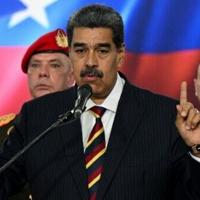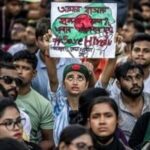Venezuela’s opposition candidate is urging President Nicolas Maduro to stop “violence and persecution” following the country’s high court stating that its upcoming decision on the disputed July 28 election cannot be contested.
Edmundo Gonzalez Urrutia, who claims to have emerged as the victor in the election by a significant margin, released a video on social media demanding Maduro to allow freedom of political expression.
“I appeal to you on behalf of all Venezuelans to halt the violence and persecution and release all compatriots who have been unjustly detained immediately,” Gonzalez Urrutia said in reference to the aftermath of the election which resulted in 24 deaths and 2,200 arrests.
“Asking for respect for our constitution is not a crime, and peacefully demonstrating to uphold the will of millions of Venezuelans is not a crime,” added the 74-year-old former diplomat.
The statement from Gonzalez Urrutia, who has not been seen in public for over a week, came after the Supreme Court declared that its forthcoming ruling on the contested election would be definitive.
The court “is continuing the evaluation that started on August 5, 2024, with the goal of issuing the final ruling… Its decisions are conclusive and must be followed,” stated the court’s president Carylsia Rodriguez.
Most observers believe that the high court is aligned with Maduro’s government, who claims a narrow victory in the election.
Opposition leaders assert that Gonzalez Urrutia won by a large margin and have presented what they claim are official results from voting locations as evidence.
On August 1, Maduro himself summoned the high court to “validate” his win.
The court held hearings with all candidates, including Maduro, this week, except for Gonzalez Urrutia, who expressed concerns about potential arrest.
Prominent opposition figure Maria Corina Machado, a former presidential candidate who was barred from running in this election, has stated that she is currently in hiding.
Both Gonzalez Urrutia and Machado are under investigation by the justice department, another state entity believed to be loyal to Maduro, for various alleged offenses, including “inciting disobedience.”
EU foreign policy chief Josep Borrell emphasized on Saturday that “respecting the will of the Venezuelan people is crucial for Venezuela to restore democracy and resolve the ongoing political and socioeconomic crisis with assurance for all.”
Borrell mentioned that the 27 EU member states are unanimously calling for the publication of polling records and independent verification, echoing similar requests from countries in Latin America and the United States.
The National Electoral Council (CNE) confirmed Maduro’s win on August 2, stating that he secured 52 percent of the vote, but declined to disclose specific tallies from polling stations, citing data breaches.
In contrast, the opposition released printed tallies, which Maduro has refuted, showing Gonzalez Urrutia receiving 67 percent of the vote.
The opposition and many observers argue that the alleged hacking of results is a fabrication by the government to avoid releasing election records.
Maduro refuted these accusations on Friday, claiming that there were “brutal” hacking incidents with “30 million attacks per minute on the electronic systems of the CNE and Venezuela.”
Opposition lawyer Perkins Rocha suggested that by turning to the high court, Maduro is essentially acknowledging that “nobody trusts” the CNE, adding that “Maduro knows he can rely on a (court) that submits to him.”
During his tenure, Maduro has presided over a national collapse, including an 80 percent decline in the GDP of the once prosperous oil-rich nation, due to domestic economic mismanagement and international sanctions.
According to the United Nations, over seven million Venezuelans have fled the country of 30 million since Maduro assumed office in 2013, with most seeking refuge in other Latin American nations and the United States.
pgf-st/bbk/acb/nro





